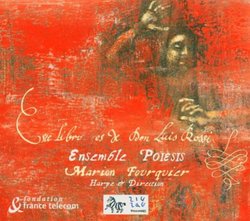| All Artists: Francesco Lambardi, Jacopo Peri, Giovanni de Macque, Carlo Gesualdo, Orazio Bassani, Claudio Monteverdi, Giovanni Maria Trabaci, Fabrizio Fillimarino, Anonymous Title: Ensemble Poiesis: Este Libro es de Don Luis Rossi Members Wishing: 1 Total Copies: 0 Label: Zig Zag Territories Release Date: 12/31/2007 Genres: Special Interest, Pop, Classical Styles: Vocal Pop, Opera & Classical Vocal, Chamber Music, Forms & Genres, Sonatas, Historical Periods, Baroque (c.1600-1750), Classical (c.1770-1830) Number of Discs: 1 SwapaCD Credits: 1 |
Search - Francesco Lambardi, Jacopo Peri, Giovanni de Macque :: Ensemble Poiesis: Este Libro es de Don Luis Rossi
 | Francesco Lambardi, Jacopo Peri, Giovanni de Macque Ensemble Poiesis: Este Libro es de Don Luis Rossi Genres: Special Interest, Pop, Classical
|
Larger Image |
CD Details |
CD ReviewsSlightly Esoteric Sound of the Triple Harp Leslie Richford | Selsingen, Lower Saxony | 06/22/2008 (4 out of 5 stars) ""Este libro es de Don Luis Rossi" [This Book Belongs to Mr. Luigi Rossi].
Track listing: 1. Toccata by Francesco Lambardo (triple harp solo) 2. Tu dormi by Jacopo Peri (tenor, triple harp, lirone) 3. Seconde Stravaganze by Giovanni de Macque (triple harp solo) 4. Canzon francese by Carlo Gesualdo (triple harp solo) 5. Susanna un giorno by Oratio Bassani after Lassus (viola da gamba, triple harp) 6. Prima Stravaganze by Giovanne de Macque (triple harp, lirone) 7. Lamento d'Olimpia by Claudio Monteverdi (soprano, viola da gamba, triple harp, lirone) 8. Ancidetemi pur per l'arpa by Giovan Maria Trabaci after Arcadelt (triple harp solo) 9. Canzon Cromatica by Fabritio Fillimarino (triple harp solo) 10. Del bel Oriente by an anonymous composer (tenor, viola da gamba, triple harp, lirone) 11. Cara la vita mia by Oratio Bassani after Giaches de Wert (viola da gamba, triple harp, lirone) 12. Capriccio sopra re, fa, mi, sol by Giovanni de Macque (triple harp solo) 13. Lamento d'Arianna by Claudio Monteverdi (soprano, triple harp) Performers: Ensemble Poiesis = Marion Forquier, triple harp; Cristiana Presutti, soprano; Lucien Kandel, tenor; Martin Bauer, viola da gamba; Paulina von Laarhoven, lirone. Recorded at the parish church in Saessolsheim (Alsace, France) in November and December 1999. Issued in 2000 as Zig Zag Territoires ZZT 000301. Total playing time: approx. 75 minutes. "Este libro es de Don Luis Rossi" is the Spanish title of an autograph manuscript by the famous seventeenth-century Italian composer Luigi Rossi. But it does not contain Rossi's own compositions. Instead, it is a collection of other composers' pieces for harp and/or harpsichord made by the young Rossi while he was still at Naples (which he was soon to leave for a distinguished career in Rome and France). The original manuscript is kept today in the British Library, but has been published in facsimile. Although the harp has a very long history, going back thousands of years, Naples is generally considered as the place where first the double, then the triple harp was invented, and at the beginning of the seventeenth century it was where a number of harp virtuosos were to be found. There is little music expressly written for harp from this time because it was generally considered very difficult to play, and anyway the instrumentation of music in the seventeenth century was usually left up to the musicians: although the pieces recorded here are noted "per l'arpa", there is sufficient evidence that the harp was considered as an alternative to the harpsichord. Marion Fourquier has made the harp her particular realm of study (at the Schola Cantorum in Basle as well as at Conservatories in France), and this recording is the result of her encounter with the Rossi autograph, which coincided with her founding of the Ensemble Poiesis. There are five pieces for harp solo here, four vocal pieces accompanied by harp, and an assortment of instrumental pieces for harp, viola da gamba and lirone. The sound is, as one might expect, rather esoteric, the pieces being generally slow and meditative. Cristiana Presutti sings the two surviving laments by Claudio Monteverdi very well, her rich soprano giving the texts an added expressivity and a flavour of adulthood which earlier recordings by the girlish-sounding Emma Kirkby could not quite achieve. Lucien Kandel's tenor is very light and is a specifically early-music voice which would sound very strange in a more modern context. The instrumentalists all perform excellently, as far as I am able to judge, and the recorded sound is wonderfully clear and present. If I give the whole four stars instead of five, it is purely because of the unusual character of the music itself, which takes a little getting used to. However, early music specialists will find this a highly interesting and informative disc, complemented by a booklet in English, French and Italian which gives all the details one could want and includes pictures both of the performers and their instruments." |

 Track Listings (13) - Disc #1
Track Listings (13) - Disc #1